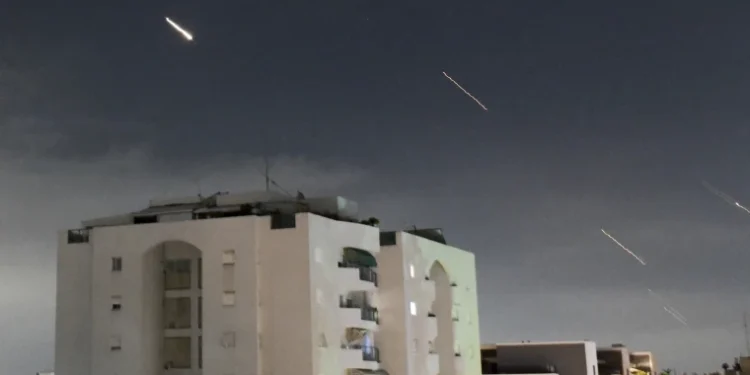Iran last night launched a series of strikes against Israeli territory for the first time ever, triggering air raid alerts and a flurry of interceptions. The unprecedented attack, which unfolded in the dead of Saturday night, according to the BBC and Al Jazeera, involved a barrage of drones, cruise missiles, and ballistic missiles, highlighting a significant shift in the dynamics of the region’s military landscape.
As sirens blared across Israel, urging residents to seek shelter, explosions reverberated through the night sky. Israel’s air defences sprang into action, intercepting incoming threats from multiple directions. The intensity of the onslaught was underscored by the involvement of at least nine countries, with projectiles originating from Iran, Iraq, Syria, and Yemen, and countered by the defense systems of Israel, the United States, France, and Jordan.
According to Rear Admiral Daniel Hagari, a spokesperson for the Israeli military, the scale of the attack was staggering. Iran unleashed over 300 drones and missiles towards Israel, comprising 170 drones, 30 cruise missiles, and 110 ballistic missiles. Although the majority of the projectiles were intercepted before reaching Israeli territory, a small number of ballistic missiles managed to breach the defenses, causing limited damage.
The geography of the region played a crucial role in the attack, with Iran strategically launching the assault from various countries. The Revolutionary Guards Corps (IRGC) of Iran claimed responsibility for deploying drones and missiles, with Iraqi security sources corroborating sightings of projectiles traversing Iraqi airspace en route to Israel. The coordinated timing of the ballistic missile strikes aimed to maximise the impact, and was synchronised with the slower-moving drones.
Background to the attack:
The operation “True Promise” was named by the IRGC to demonstrate the commitment of top leaders in Tehran, including Supreme Leader Ayatollah Ali Khamenei, to follow through on their promises of “punishment” for attacks by Israel and other parties.
The attack appears to be a response to an Israeli strike on the Iranian consulate in Damascus on April 1. This strike resulted in the deaths of seven IRGC members, including two high-ranking generals responsible for operations in Syria and Lebanon, as well as six others.
The focus of the action was to enhance Iran’s deterrence, which some critics argued had been weakened due to the United States and its allies’ aggressive policies and military attacks in the region. This concern was particularly heightened following the assassination of top general Qassem Soleimani in Iraq in January 2020.
It seems that Iranian officials demonstrated a certain level of restraint following the assassination of Razi Mousavi, a high-ranking IRGC commander, in Syria. This occurred during an Israeli air raid amidst the ongoing conflict in Gaza.
Choosing not to take action, settling for less impactful strikes, or relying solely on the “axis of resistance” of aligned groups in the region would be seen as a significant burden for Iran, both domestically and internationally.
Israel and its allies respond
In response to the onslaught, Israel and its allies mounted a formidable defence, intercepting nearly all incoming threats. Rear Admiral Hagari noted that 99% of the barrage was neutralized, demonstrating the effectiveness of Israel’s air defence systems. The United States played a pivotal role in bolstering Israel’s defenses, deploying aircraft and warships to the region ahead of the attack. Operating from undisclosed bases, US forces intercepted Iranian drones over southern Syria, while British Royal Air Force (RAF) Typhoon fighter jets joined the effort to thwart the aerial assault.
Despite the successful defence, the attack inflicted casualties and caused damage in Israel. One ballistic missile struck the Nevatim Air Force base in the Negev desert, resulting in injuries, including a seven-year-old girl from a Bedouin Arab community. The severity of the situation prompted Israeli officials to warn of a significant response to the aggression, signalling that the confrontation with Iran was far from over.
In the wake of the unprecedented attack, diplomatic efforts to address the crisis have been set in motion. The United Nations Security Council convened an emergency meeting at Israel’s request, while US President Joe Biden announced plans to coordinate a united diplomatic response with leaders of the G7 nations. Amid escalating tensions and mutual threats of retaliation, the international community braces for further developments in the volatile region.
International Reactions:
There have been a range of reactions to the attack.
UN Secretary-General Antonio Guterres has condemned Iran’s attack on Israel, saying that he urges “all parties to exercise maximum restraint.”
“I urge all parties to exercise maximum restraint to avoid any action that could lead to major military confrontations on multiple fronts in the Middle East,” he said in a statement adding, “I have repeatedly stressed that neither the region nor the world can afford another war.”
UK PM Rishi Sunak strongly condemned the Iranian attack, stating, “The strikes risk inflaming tensions and destabilising the region.” He affirmed the UK’s commitment to Israel’s security and regional stability, emphasising, “No one wants to see more bloodshed.” He has also just confirmed that the UK helped in downing some of the missles.
Canadian PM Justin Trudeau expressed unequivocal condemnation, saying, “We stand with Israel,” and highlighting concerns about Iran’s actions exacerbating regional instability.
French Foreign Minister Stephane Sejourne condemned Iran’s attack in the strongest terms, warning of the risk of military escalation due to Iran’s destabilizing actions.
German Ambassador to Israel Steffen Seibert expressed solidarity with all Israelis affected by the attack, emphasizing, “May they all be safe,” and underscoring the inclusivity of his message towards different communities within Israel.
Other implications
It is evident that Tehran acknowledges the potential advantages for Israel and Prime Minister Benjamin Netanyahu’s government in intensifying tensions in the region and pressuring the US military to take further action against Iran.
However, the recent Iranian attacks have momentarily diverted global focus away from the tragic loss of countless lives among women and children in the Gaza Strip. In the long term, these attacks could potentially result in Iran gaining soft power advantages over other regional powers in the Muslim world.



